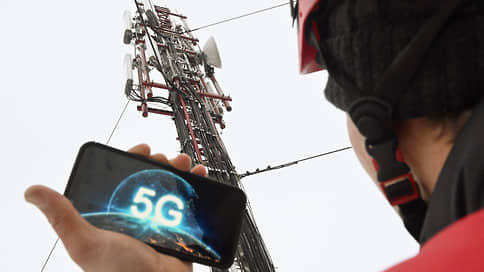With frequencies, we decided not to grind
[ad_1]

The Ministry of Digital Development proposed to develop 5G networks on the basis of a single radio frequency operator with state participation, which will receive free of charge frequencies in the “golden range” of 3.4–3.8 GHz in the “compatibility mode with special services.” This means that the security forces will be able to turn off the radiation of radio-electronic means of communication (RES), when and where they deem it necessary. Now they do not have direct access to the network management systems of operators, and the restriction of services occurs through the Ministry of Digital Development.
According to Kommersant’s sources, during the session held by Prime Minister Mikhail Mishustin on June 20 on the draft strategy for the development of the communications industry until 2035, the Ministry of Digital Development put forward a number of initiatives, including the creation of a single radio frequency operator with state participation to introduce the 5G communication standard. The Ministry proposes to donate to a single operator the frequency bands for creating 5G communication networks until 2035, including the spectrum used by analog TV broadcasters (694-790 MHz), the 4.8-4.99 GHz bands (selected by the Ministry of Digital Development as a priority for 5G) and band 3 .4–3.8 GHz “in compatibility mode with special services.”
Also, a single operator must introduce “a frequency sharing system with the ability for law enforcement agencies to turn off the radiation of radio electronic communications (RES) of operators in a given location.” Kommersant’s interlocutor, who is familiar with the situation, believes that the joint venture will be created on the basis of Rostelecom. Mikhail Mishustin’s office redirected the request to the Ministry of Digital Development. They confirmed that they had proposed an initiative to create a single operator as a consortium of market participants for the introduction of 5G.
The development of 5G networks based on a single operator has been discussed since 2020, when MegaFon and Rostelecom created New Digital Solutions LLC to test the new standard in the 4.4-4.99 GHz band, in 2021 VimpelCom joined the joint venture ”, and in 2022 – MTS. The task of the joint venture is to conduct tests for electromagnetic compatibility, research the possibility of using radio frequency bands for the construction of 5G networks, as well as clearing the spectrum.
In accordance with the 5G development concept, which was approved by the Ministry of Digital Development in 2019, an anchor operator will be selected in each region to develop the new standard. The network will be available to other JV participants, but they must compensate the anchor operator for construction costs. MTS, VimpelCom, Tele2 declined to comment, MegaFon and Rostelecom did not respond to inquiries.
Initially, market participants did not support the idea of creating a single operator, emphasizing that since 2020 they have been building communication networks on 5G-Ready equipment, and creating a common network will require new expenses. The FAS also opposed it, warning that this could lead to monopoly, stagnation and loss of revenue from potential auctions for frequencies by the state (see Kommersant dated May 23, 2019). But then the service supported the idea, provided that the operator gives non-discriminatory access “for all representatives of the mobile radiotelephone communications market”, including regional operators (see “Kommersant” dated December 25, 2020).
Against the backdrop of the current shortage of foreign telecommunications equipment, the concept of a single operator for 5G looks “more relevant than a few years ago,” admits a Kommersant source on the market: “But the already created joint venture over the years has been engaged only in research, and in terms of clearing the spectrum and agreements no progress has been made with the law enforcement agencies.” Now no one in the Russian Federation has 5G networks in commercial operation, since operators cannot receive frequencies in the 3.4–3.8 GHz range. It is chosen for the standard in the world, but in Russia it is occupied by special services.
The most important point, says one of the equipment suppliers, is that a single operator should enable the security forces to turn off the radiation of radio electronic devices of operators in a given location: “Now the Ministry of Defense and other departments do not have such functionality, the operational restriction of communication networks occurs through the channels of the State Commission on Radio Frequencies and Mintsifra”. So, recently, on behalf of the Ministry of Digital Development, operators limited communication services in Sochi and Adler in connection with the arrival in Sochi of a number of high-ranking officials (see Kommersant of June 7). If the security forces get access to the operators’ systems for managing the network, they will be able to turn off services without the participation of the Ministry of Digital Development, the interlocutor of Kommersant believes. Moreover, he does not consider this an unambiguously negative factor, believing that the direct access of the security forces can facilitate the decision to allocate frequencies.
[ad_2]
Source link





